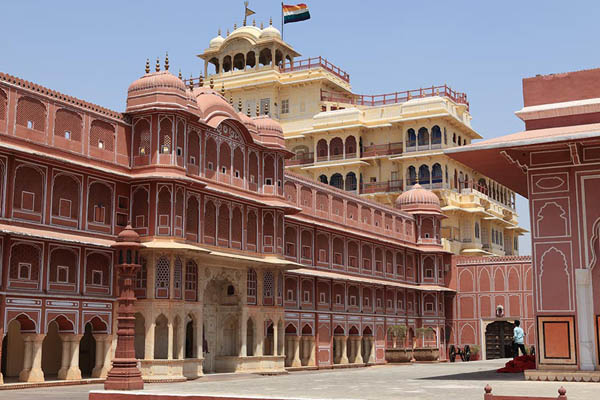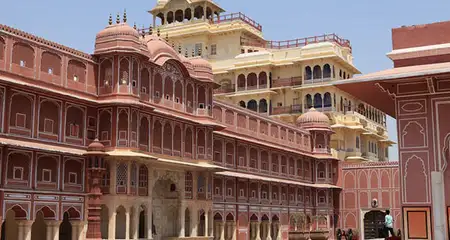Sprawling and grand, City Palace is the perfect epitome of Rajput heritage and culture in Jaipur. If you love forts, knowing about their history and the lives of royal families, make sure you visit this gorgeous palace. Apart from City Palace, the Pink City of Jaipur is peppered with many forts and historical gems that are now open for tourists. Now, read on to know more about City Palace’s history, architecture, things to see, and some lesser-known facts.
City Palace, Jaipur Information
|
Location |
Tulsi Marg, Gangori Bazaar, Jaipur, Rajasthan |
|
Timings |
9:30 AM to 5:00 PM |
|
Entry Fee |
For Indians: Rs 200 For Foreign tourists: Rs 700 50% discount for children and students with valid ID. Additional charges for exclusive areas of the palace. |
|
Entrance |
Udai Pol and Virendra Pol |
|
Year of Establishment |
1727 |
|
Commissioned by |
Sawai Jai Singh II |
|
Architectural Style |
Rajput and Mughal Architecture |
|
Material Used |
Red and Pink Sandstone |
|
Time Required |
2-3 Hours |
|
Best Time to Visit |
October to February |
History
The popular Kachhwaha clan of Rajputs ruled over the areas of Jaipur and Amer for centuries. The city, as well as City Palace, was established by Sawai Jai Singh, who planned to shift his capital in the 17th century from Amer. And even today, City Palace continues to uphold the beauty and rich culture of Jaipur and the dynasties it has witnessed. One of the main reasons behind the decision to establish Jaipur and City Palace was the shortage of water and resources as well as the difficulty in the administration of the increasing population of Amer.
It was Man Singh II who ruled over City Palace and Jaipur around the time of India’s Independence. The entire city was painted pink to welcome King Edward VII (then Prince of Wales), and some areas of the city till this day remain so. The entire city and City Palace showcase the influence of Mughal and British allegiance to the Jaipur throne.
City Palace, Jaipur: Today
Nowadays, City Palace is one of the few places where one region is reserved for the royal family’s residence and the other is open for public viewing as a museum and courtyard. You will find many weapons from different historical periods here. Explore the beautiful courtyards too, where special guests were hosted in bygone days. The palace is also home to many antique collections of the personal belongings of the royal family.
Architecture
What is special about the architecture of City Palace? Well, it is made of red and pink sandstone and has large and spacious courtyards. Its construction is evident of the perfect blend of Rajput and Mughal architectural styles. Several decades ago, many areas were converted into museums for showcasing the rich history of the region and the lifestyle of the rulers. The architects of this beautiful palace are the same masterminds who designed the entire city of Jaipur, Vidyadhar Bhattacharya and Samuel Jacob. Apart from Udai Pol and Virendra Pol, where the ticket counters are present, the remaining gates are used by the royal family that lives here even today.
Things to See
- Chandra Mahal: This massive structure goes up to seven stories and its entrance is adorned with a stunning peacock design. The entire city of Jaipur is visible from the balconies of this Mahal. Each floor is used for a different purpose. The most popular, however, is the ground floor where the museum is set up.
- Pritam Niwas Chowk: Here you will find four gates indicating four different seasons. The first gate depicts autumn, second summer, third spring and fourth winter.
- Diwan-i-Am: As the name suggests, this place was used to hold meetings with the public. It is open, spread over a large area, and decorated with embroidered carpets and walls.
- Diwan-i-Khas: This is much smaller and private as compared to Diwan-i-Am. It has special silver vessels about which you will learn later. It was reserved for special guests of the king and the royal family.
- Maharani Palace: This was used as the residence for the women of the royal family but now displays several weapons, as a part of the City Palace Museum.
- Baggi Khana: It is a special place that displays different kinds of cabs and vehicles since the time when Queen Victorian ruled England.
How to Reach
City Palace is easily accessible from Jaipur Airport as well as railway station. It is approximately 12 km from the airport while nearly 5 km from the railway station. It is situated in the old market area, close to Jantar Mantar. You can easily find a cab or rickshaw to take you there from any part of the city.
To reach Jaipur, you can choose any mode of transport, car, flight or train. It is well connected to almost all major cities of India and is especially close to Delhi (280 km).
Lesser-Known Facts
- You will find two extremely beautiful seasonal gates at City Palace. One is Green Leheriya Gate that indicates the spring season, built to respect Lord Ganesha, and Rose Gate, which depicts winter and is dedicated to the Female Goddess.
- There is a silver jar, kept in display here that weights more than 300 kg and was used to carry water from River Ganga. It has a capacity of nearly 4000 litres.
- One of the most beautiful Mahals of this Palace, Mubarak Mahal, was used as a reception hall in the time of Sawai Madho Singh. Its beautiful architecture and design will leave you amazed.
Nearby Attractions
- Jantar Mantar (100 m)
- Tripolia Bazaar (400 m)
- Hawa Mahal (1 km)
- Johari Bazaar (1 km)
- Bapu Bazaar (2 km)
- Albert Hall Museum (3 km)
- Birla Mandir (4 km)
- Jal Mahal (6 km)
- Amer Fort (8 km)
- Anokhi Museum (9 km)
- Jaigarh Fort (10 km)
- Nahargarh Fort (14 km)
So, if you are a history buff, looking to admire a palace that is a medley of history, art, antiques and royal culture, make sure to include City Palace in your list of places to visit in Jaipur. Also, remember that October to February is the best time to explore Rajasthan so you should book your transport and hotels in Jaipur well in advance to grab the best offers and deals.




























